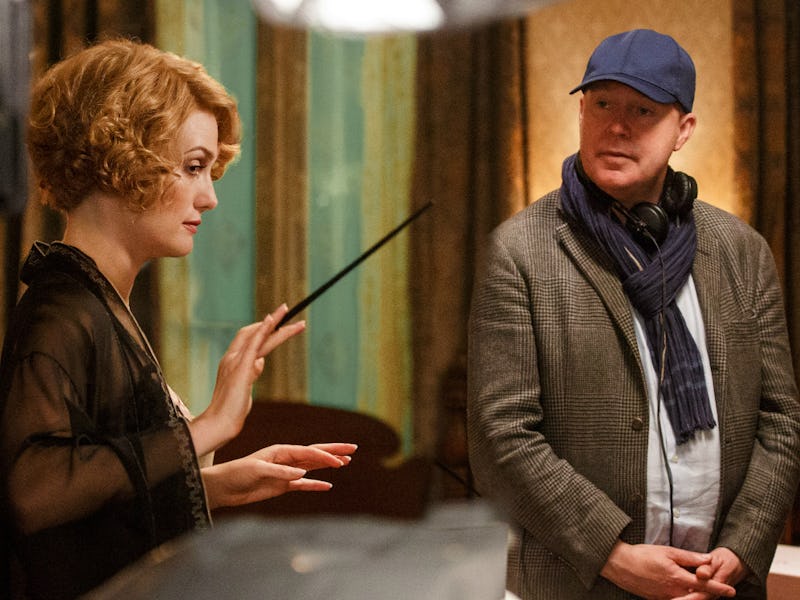Director David Yates Is the Unsung Hero of the Potterverse
From 'Harry Potter' to 'Fantastic Beasts,' Yates is the true magician behind the camera.

There is an overabundance of genius at work in the Harry Potter films, but one essential component is someone who often gets overlooked: David Yates, the director of the last four Harry Potter films and this weekend’s Fantastic Beasts and Where to Find Them.
Yates isn’t a flashy filmmaker, which is perhaps why his contributions rarely come up in the many, many conversations about the hugely successful franchise. His pragmatic style can be traced back to when he started out directing British television, capping off his work with the six-part journalism thriller State of Play and then the sobering investigative drama Sex Traffic. His big theatrical debut came late in the Harry Potter game, five films and three directors after the franchise began, and until Yates, the series seemed like a directorial relay with each new face taking up the magical filmmaking baton.
The early years were explorative for the series, as we were introduced to the Boy Who Lived and the magical world he inhabited. Hollywood director Chris Columbus was tapped to introduce the world to Hogwarts in the first two films, a safe choice for an important task. Sorcerer’s Stone and Chamber of Secrets were perfectly adequate films and largely safe exercises in fantasy, almost trial runs to allow everyone involved to look around at each other to try and make sure they were doing it right.
As Harry grew, so did the series. Prisoner of Azkaban brought in Alfonso Cuaron, the only real “auteur” of the Potter directors, whose entry usually sits atop best-of-series lists for his macabre aesthetic. It’s like a Tim Burton film without all the overwrought goth trappings. Cuaron gets all the praise partly because everyone loves his later directorial successes like Children of Men, but also because he was a dangerous choice who delivered a sufficiently unique outlier in the franchise. That was the one without Voldemort, mind you.
Goblet of Fire continued that growth but traded Cuaron’s auteurship for new director Mike Newell’s stewardship. The fourth book and movie are known for being the installment in which shit got real, and Voldemort finally becomes a corporeal threat. It’s primarily a thrilling developmental build-up — replete with Triwizard Tournaments and Yule Ball teen angst — there to begin the pace of the three-book and four-movie marathon sprint to the end. After that, Newell was out, and Yates was in.
After his somewhat awkward series introduction in Order of the Phoenix, Yates’s films got stronger as they went on. The dark and brooding Half-Blood Prince for instance, incorporates the Dutch angle experimentation of noir films, especially when we get into the fateful Snape vs. Dumbledore showdown.
The two-part Deathly Hallows also attempts a playfulness that keeps things fresh as Harry deals with Voldemort’s tightening grasp on the world. Harry, Hermione, and Ron’s Horcrux-seeking odyssey in Part 1 would be nothing more than a movie about scared teens camping in the woods if it weren’t for Yates’s ability to focus on the grounded relationship drama driving this installment towards some very pivotal moments in the series.
Book fans cringe at non-canon moments, like when Harry and Hermione let off some anxiety by dancing to a Nick Cave song while on the lam. Yates deserves credit for actually utilizing the medium to visually portray the deep resonance of a seven-year relationship between two friends.
Part 2 is blockbuster fantasy filmmaking writ large with expansive, David Lean-esque moments of wand-waving grandeur. The scene where Voldemort’s army of Death Eaters ascends a hill outside Hogwarts before their nighttime attack is haunting and memorably un-flashy. Sure, Part 2 was really a two-hour magician battle between good and evil, but there’s no denying Yates is as focused on the epic chaos as he is down to the small stuff, especially in the climactic moment where it’s just Harry and Voldemort facing off in the Hogwarts courtyard.
Yates’s tutelage of these pivotal moments ultimately doesn’t falter under the emotional weight of such an epic, decade-long story.
When he was up for the directing gig on Sorcerer’s Stone in 2001, legendary filmmaker Steven Spielberg passed on the project because such a popular adaptation seemed too easy. “It’s just a slam-dunk. It’s just like withdrawing a billion dollars and putting it into your personal bank accounts,” he said at the time. “There’s no challenge in that.” But if Yates’s contributions have proved anything, it’s that there are many challenges left in the Potterverse. His spin-off, Fantastic Beasts and Where to Find Them hits theaters on Friday, and he’s agreed to direct four planned sequels.
If he does all those films, Yates will have been responsible for two decades worth of films for one of the biggest franchises ever created. Fans should be excited for Yates as a unifying figure in the series. It may not look like it, but he’s conjured more onscreen magic than Harry or J.K. Rowling could have ever imagined.